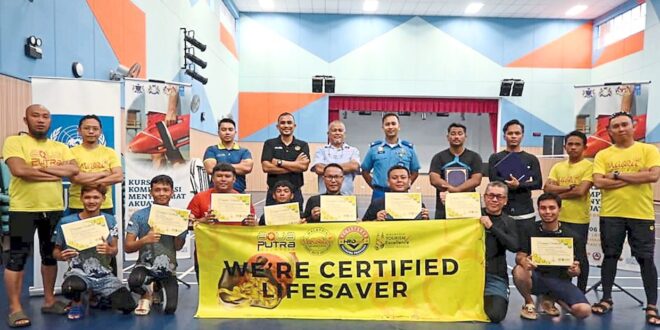Boatmen, island-hopping guides, chalet and resort operators learn water rescue techniques
EIGHT tourism industry operators were selected to be part of an Aquatic Competency Rescue Course, to ensure sustainability as well as safety of visitors to Johor’s islands.
The three-day programme was organised by Mersing District Council (MDM) and the United Nations Development Programme (UNDP) Malaysia.
MDM president Mohd Norman Noh said the programme was held as part of the local council’s plan for sustainable tourism.
“We wanted to create more competent industry players in all aspects, especially those that involve safety,” he said.
He added that the candidates were taken to Southern Region Civil Defence Training Centre (Pulapas) in Kluang, Johor, to attend the course.
“Those selected are boatmen and chalet and resort operators, as well as island-hopping guides who work on islands off Mersing,” Mohd Norman said when contacted by StarMetro.
He said the candidates were also exposed to water rescue techniques, especially during emergency situations.
“This course is important in increasing skills of the human capital and youths in Mersing,” he said, adding that it also stressed the importance of having knowledge about safety.
The candidates were also given practical training on swimming and aquatic rescue as well as cardiopulmonary resuscitation (CPR) and water safety theory, said Mohd Norman.
Mohd Norman said the council had worked together with Reef Check Malaysia (RCM) Mersing in placing a mooring buoy in Pulau Besar.
“This is part of our effort to protect and preserve the coral reefs around the island,” he said.
According to RCM Mersing programme manager Nazirul Amin Azmi, six mooring buoys were placed at four islands.
Apart from Pulau Besar, the other islands are Pulau Tengah, Pulau Hujung and Pulau Harimau.
“This is one of our annual activities after the monsoon season ends and the islands are open for tourist activities.
“The mooring buoys will be used by boat operators to tie their boats during snorkelling activities instead of dropping anchors, which can damage reefs,” said Nazirul.
 BeritaKini.biz Berita Viral Terkini di Malaysia
BeritaKini.biz Berita Viral Terkini di Malaysia





